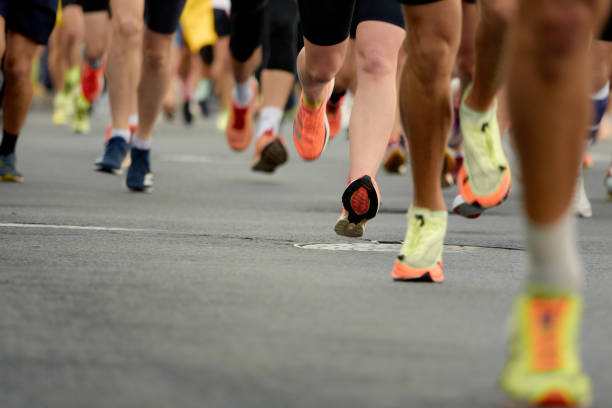
Are you getting ready for your first full marathon or half marathon? Or maybe you are a seasoned runner and want to level up your race planning? Then you've come to the right place!
Our marathon pace calculator was created to help you calculate your running pace and adjust your race preparations accordingly. For instance, you can use it to calculate the pace you need to finish a marathon in under 4 hours or evaluate your previous pace to adjust your training plan.
Keep on reading as we uncover how to use this training pace calculator.

Here's a step-by-step guide to calculating your marathon pace before you use the calculator:
Start by setting a goal for your marathon finishing time. This could be based on previous race times, training progress, or personal targets.
For example, if you aim to finish the marathon in 4 hours and 15 minutes, convert this time to minutes. 4 hours is 240 minutes, plus 15 minutes equals 255 minutes total.
Divide the total time in minutes by the total distance of the marathon. For instance, if you're running a marathon in miles, divide 255 minutes by 26.2 miles. If you're running in kilometers, divide 255 minutes by 42.195 kilometers.
The result of step 3 will give you your average pace per mile or kilometer. Convert this decimal value to minutes and seconds. For example, if your pace per mile is 9.75 minutes, this translates to 9 minutes and 45 seconds per mile.
If you're using kilometers, repeat steps 2-4 using the total distance in kilometers and calculate your pace per kilometer.
Consider terrain, weather conditions, and your current fitness level when setting your goal pace. Adjust your pace accordingly if you anticipate any challenges during the race.
If you want to complete a marathon in 4 hours:
Convert 4 hours to minutes: (4 \times 60 = 240) minutes.
Divide 240 minutes by the marathon distance (42.195 km): (240 / 42.195 \approx 5.69) minutes per kilometer.
Rewritten as 5 minutes and 41 seconds per kilometer.
Remember that this calculated pace is an average pace you should aim to maintain throughout the marathon.
During the race, you may need to adjust your pace slightly based on how you feel and the conditions on race day.
It can also be a good idea to practice running at your goal pace during training to familiarize yourself with the effort required.
Pace is the average time it takes to run one kilometer or mile. It’s usually expressed in minutes per unit distance (e.g., 6:21 minutes per kilometer).
Speed is the average number of kilometers or miles run in one hour. It is calculated by dividing the total distance by the time taken to run that distance.
Using a running pace calculator will help you figure out how fast you need to run in a race to cross the finish line in a certain time.
This tool is also great for planning your running speed during training and races, so you can reach your goals without going too fast or too slow.
Start by choosing the type of activity you’ll participate in. In the case of a marathon, it's obviously running.
Suppose you plan to run a full marathon (42.195 km). Enter this number into the Distance field.
Set your goal time (e.g., under 4 hours).
Input this value into the “Time” field.
The calculator will display the speed you need to achieve your goal (e.g., 10.55 km/h).
The most crucial value is your required pace. To finish a marathon in under 4 hours, you need an average pace of approximately 5.69 minutes per kilometer (or 5 minutes and 41 seconds per kilometer).
A half marathon race is 21.0975 kilometers (or approximately 13.1094 miles) long.
The pace is calculated by dividing your finish time by the distance of the race:
Pace = Finish Time / Distance
Example Calculation:
Let’s say you completed a half marathon in 1 hour and 43 minutes.
Convert the finish time to minutes: (1 \text{ hour} \times 60 + 43 = 103) minutes.
Divide 103 minutes by the half marathon distance (21.0975 km):
Pace per kilometer: (103 / 21.0975 \approx 4.87) minutes per kilometer.
Therefore, your half-marathon pace is approximately 4 minutes and 52 seconds per kilometer or 7 minutes and 51 seconds per mile.

The average marathon time varies depending on factors such as age, gender, experience, and ability level. Let’s break it down.
According to Run Repeat research, the overall average marathon time worldwide is approximately 4 hours and 29 minutes (4:29:53).
For men, the average marathon time is around 4 hours and 21 minutes (4:21:03).
The average marathon time for women is approximately 4 hours and 49 minutes (4:48:45).
Remember that these averages provide a general idea, but individual performance can vary significantly. Whether you’re aiming for a personal best or simply completing the marathon, consistency and training, play crucial roles.
The average marathon pace varies based on factors such as age, gender, experience, and ability level. Let’s explore the average paces for both men and women:
The average pace for a male marathon runner is approximately 6.43 minutes per kilometer (10.34 minutes per mile).
The overall average marathon time for men is between 4 hours and 19 minutes to 4 hours and 30 minutes.
The average pace for a female marathon runner over 26.2 miles is about 7.26 minutes per kilometer (11.55 minutes per mile).
The overall average marathon time for women is around 4 hours and 8 minutes.
Remember that these averages provide a general idea, but individual performance can vary significantly.
Factors like terrain, weather, and personal fitness play a crucial role. Whether you’re aiming for a personal best or simply completing the marathon, consistency and training are key.
Whether you're gearing up for your first marathon or aiming to enhance your race strategy, understanding your running pace is crucial.
Our marathon pace calculator offers a simple solution to compute your pace and tailor your race preparations accordingly. Input your desired finish time to determine the speed needed to meet your goal, aiding in both training and race-day execution.
Additionally, the calculator can help evaluate past performances to refine future training plans. Whether you're aiming for a sub-4-hour marathon or assessing your half marathon pace, this tool provides valuable insights to optimize your running journey.